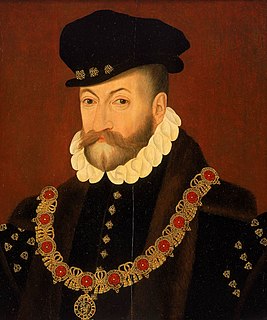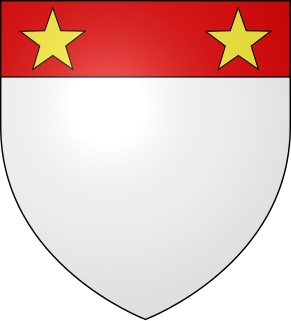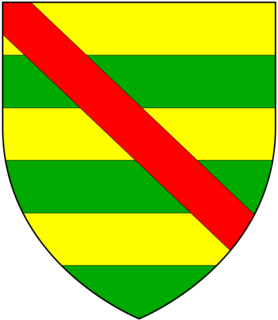
Poynings' Law or the Statute of Drogheda was a 1494 Act of the Parliament of Ireland which provided that the parliament could not meet until its proposed legislation had been approved both by Ireland's Lord Deputy and Privy Council and by England's monarch and Privy Council. It was a major grievance in 18th-century Ireland, was amended by the Constitution of 1782, rendered moot by the Acts of Union 1800, and repealed by the Statute Law Revision (Ireland) Act, 1878.

Sir Edward Poynings KG was an English soldier, administrator and diplomat, and Lord Deputy of Ireland under King Henry VII of England.

Henry Percy, 3rd Earl of Northumberland, was an English magnate.

Reynold Grey, 3rd Baron Grey of Ruthin, a powerful Welsh marcher lord, succeeded to the title on his father's death in July 1388.

Edward Fiennes de Clinton, 1st Earl of Lincoln, KG was an English nobleman and Lord High Admiral. He rendered valuable service to four of the Tudor monarchs.
Henry Deane was Archbishop of Canterbury from 1501 until his death.
Sir James OrmondaliasButler was the illegitimate son of John Butler, 6th Earl of Ormond. He was Lord Treasurer of Ireland from 1492 to 1494, and helped to defend the Lordship of Ireland against the forces of Perkin Warbeck. He was murdered by Sir Piers Butler on 17 July 1497. Piers would later hold the title of Earl of Ormond.
William Bardolf, 4th Baron Bardolf and 3rd Baron Damory of Wormegay, Norfolk, was an extensive landowner in Norfolk, Lincolnshire, Suffolk and Surrey. He was the son of John Bardolf, 3rd Baron Bardolf and Elizabeth Damory, suo jure 2nd Baroness Damory. His maternal grandparents were Sir Roger Damory, Lord Damory and Lady Elizabeth de Clare, a granddaughter of King Edward I. In 1382, Bardolf had livery of his lands from the Crown.

Baron St John de/of Basing is a former title in the Peerage of England.

The title of Baron Poynings was created twice in the Peerage of England.
Events from the year 1494 in Ireland.
Events from the year 1459 in England.
Thomas Poynings, 1st Baron Poynings was an English soldier and courtier.
Sir Thomas Mortimer was a medieval English soldier and statesman who served briefly in several important administrative and judicial state offices in Ireland and played a part in the opposition to the reign of King Richard II. He was an illegitimate member of the Mortimer family, which was then one of the leading noble houses in England and Ireland, and he helped to manage the Mortimer lands during the minority of the family heir, his nephew Roger, earl of March. Sir Thomas was also a close associate of the Lords Appellant who opposed the reign of King Richard II.

Sir Adrian Poynings was a military commander and administrator. The youngest of the illegitimate children of Sir Edward Poynings, he played a prominent role in the defence of the English garrison at Le Havre in 1562–63.
Sir Robert Poynings, was the second son of Robert Poynings, 4th Baron Poynings (1382–1446). He joined the rebellion of Jack Cade in 1450, and was slain fighting on the Yorkist side at the Second Battle of St Albans in 1461.
Elizabeth Paston was a member of the English gentry who is regularly referred to in the extensive collection of Paston Letters. She was the only daughter of a Norfolk lawyer, William Paston and Agnes Barry. In her late teens and twenties she resisted marriage to several men proposed by her mother and brothers, before marrying Sir Robert Poynings in 1458, with whom she had a son Edward Poynings.
Events from the year 1527 in Ireland.
Poynings' Law or the Statute of Drogheda may refer to the following acts of the Parliament of Ireland:

An Act confirming all the Statutes made in England is an act passed by the Parliament of Ireland which gave all statutes "late made" by the Parliament of England the force of law in the Lordship of Ireland. It was passed by Poynings' Parliament, along with other acts strengthening English law in Ireland, one of which was commonly called "Poynings' Law" until its virtual repeal by the Constitution of 1782.
This page is based on this
Wikipedia article Text is available under the
CC BY-SA 4.0 license; additional terms may apply.
Images, videos and audio are available under their respective licenses.







